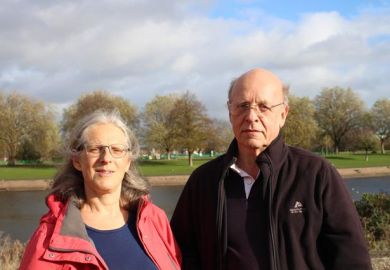Students in England will no longer be asked how satisfied they were with their course, the regulator has confirmed as part of its proposed changes to the nation’s biggest higher education survey.
The Office for Students has outlined how it thinks the influential National Student Survey should operate from 2023 to ensure that it “remains fit for purpose”.
Ideas put out for consultation include adding questions on freedom of expression and mental well-being, as well as moves to “ask more direct questions generally” and a shortening of the window in which the annual census of final-year undergraduate students is run.
But the removal of Question 27, which looks at overall satisfaction, could prove to be the most significant change. The plan from the OfS – which also coordinates the NSS on behalf of regulators in the devolved nations – would see this summative question removed entirely in England and amended to lose the word “satisfaction” in Scotland, Wales and Northern Ireland, where regulators had expressed a desire to keep it.
The change is needed because of concerns that the question detracts from the wider findings of the survey and is too consumerist in nature, according to a consultation report that said there had been “significant concerns” about the wording and “no consensus on what should replace it”.
Question 27 could therefore be dropped just as the most recent iterations of the survey – conducted while the major review was being carried out – recorded that overall satisfaction has slipped to historically low levels, mostly because of the fallout from the pandemic.
The NSS has been run annually since 2005 and attracts about 300,000 responses a year. Its findings are used by regulators when assessing the quality of degree courses, while those institutions that have done well feature the results prominently on marketing materials.
The OfS said including questions on key topics such as free speech would allow the survey to reflect the growing importance of these issues on campuses and to track their impact on students.
The consultation includes an example of what a free speech question could look like, asking “During your studies, how free did you feel to express your ideas, opinions and beliefs?”, with options in response of “very free”, “fairly free”, “not very free”, “not at all free” and “this does not apply to me”.
The sector has been under pressure from the government to protect universities from “cancel culture”, with legislation currently working its way through Parliament.
Vice-chancellors have hit back at suggestions that free speech is under threat, although a recent survey conducted by the Higher Education Policy Institute found that students today appear to be less tolerant than former generations.
The changes to how the questions are worded would move away from a standard “agree/disagree” Likert scale. For example, rather than being asked to what extent they agreed with the sentence “the criteria used in marking have been clear in advance”, students would be asked “how clear were the marking criteria used to assess your work?” with a scale ranging from “very clear” to “not at all clear”.
Conor Ryan, director of external relations at the OfS, said the NSS needed to keep up with the changing nature of learning and teaching, adding that the proposed new survey “will help identify trends and provide a consistent measure of students’ academic experience”.
A consultation on the proposals runs for five weeks from 27 July, and Mr Ryan urged students and providers to get involved in the process “to ensure the questions we ask remain meaningful and reflect the most important aspects of higher education”.
“The NSS is a vital tool that informs regulation and providers’ decision-making. This review will ensure it continues to stand the test of time,” he added.
Register to continue
Why register?
- Registration is free and only takes a moment
- Once registered, you can read 3 articles a month
- Sign up for our newsletter
Subscribe
Or subscribe for unlimited access to:
- Unlimited access to news, views, insights & reviews
- Digital editions
- Digital access to THE’s university and college rankings analysis
Already registered or a current subscriber?








